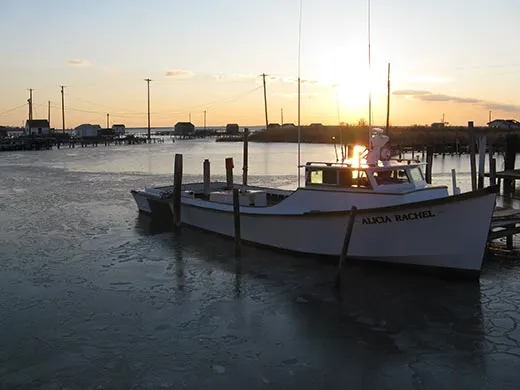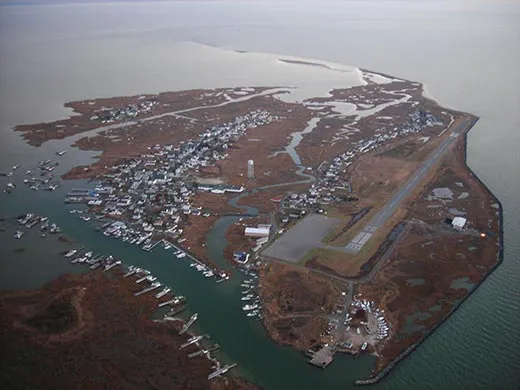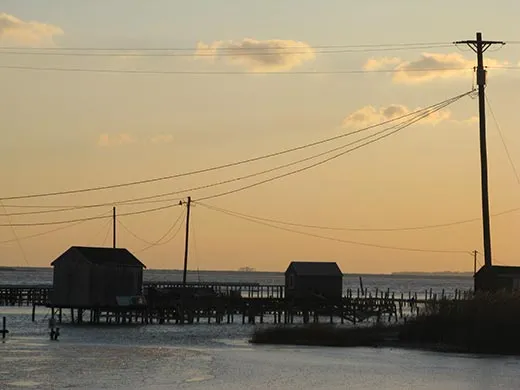Tangier Island and the Way of the Watermen
In the middle of the Chesapeake Bay, a culture struggles to survive as aquatic life becomes scarce
/https://tf-cmsv2-smithsonianmag-media.s3.amazonaws.com/filer/Town-of-Tangier-631.jpg)
Tangier Island is an isolated patch of Virginia marshland in the middle of the Chesapeake Bay, just south of the Maryland line. For centuries the island has been a community of watermen, the Chesapeake term for people who harvest the crabs, oysters and fish in the bay.
"Tangier is a living history. We've been doing this hundreds of years," says James Eskridge, the mayor of Tangier. "We are really not that far from D.C. or Richmond, but you can come here and step back in time."
Houses line narrow streets that follow patches of high ground in the town of Tangier, population 535. With no bridge to the mainland, supplies and people arrive on the daily mail boat from Crisfield, Maryland, 12 miles away. Most people get around the 3-mile-long island by foot, golf cart or bicycle.
Residents speak with an accent so distinctive that after a quick listen they can easily tell if someone is from Tangier or another nearby harbor. And the island has its own vocabulary, prompting a resident to compile an extensive dictionary of local terms (including "mug-up" for hearty snack, "cunge" for deep cough). Conversations are peppered with expressions like "yorn" for yours and "onliest" for only.
Almost everyone on the island goes by a colorful nickname; favorites include Puge, Spanky, Foo-Foo, Hambone and Skrawnch. Locals call Mayor Eskridge "Ooker" after the sound he made as a boy when he imitated his pet rooster.
But Tangier's distinct culture is at risk as the Chesapeake's once bountiful aquatic life becomes scarce. The bay's oyster population collapsed in the 1980s and has yet to recover. Now crab levels have plummeted, from more than 800 million total crabs in the bay in the early 1990s, to around 200 million in recent years.
Tangier's woes are linked to the 17 million other people who live in the 200-mile-long bay's watershed, which encompasses parts of six states and the cities of Baltimore, Washington and Richmond. Runoff from farms, suburban lawns and urban areas pollutes the estuary. This smothers underwater grasses that provide crucial habitat to crabs and creates algae blooms that cause oxygen-depleted "dead zones.".
According to Bill Goldsborough, fisheries director at the nonprofit Chesapeake Bay Foundation controlling this pollution takes years of political will calling for tough measures. With crab numbers plummeting, "we had no other choice than to cut back on the harvest" he says.
As a result, in 2008, Maryland and Virginia imposed a host of new restrictions on commercial crabbing in the Chesapeake. The closure of the winter crab season, lucrative work in the colder months, was particularly hard for Tangier.
"Our objective is to try to restore the health of bay and aquatic life so that it can support viable fisheries," explains Goldsborough. "We see that task taking place over a longer term... But the watermen don't have the luxury of the long term. They are concerned about making their next boat payment."
Mayor Eskridge says that when the new rules were announced, "it was really a down time on the island…. I termed it like a hurricane, when the storm is coming and you don't know what's on the other side."
Watermen typically work without health or retirement benefits, and never know how much they will earn in a season, though they take pride in their independence. "The good Lord gives you strength, and you go out and make your living. You don't have people all over you," says 30-year-old waterman Allen Parks. "You work when you want and like you want. But it's a hard life. It's not an easy life."
The island now has 65 watermen, less than half of the 140 on Tangier in 2003. The loss is an emotional issue on the island. Life on the water stretches back for generations for nearly everyone on Tangier, yet many fear this could be the last generation of Tangier watermen.
In recent years, a number have switched to working on tug boats, spending weeks away from home as they roam up and down the East Coast. Today, there are just as many men working "on the tug" as there are watermen. With few other options on the isolated island, many of the younger generation seek jobs on the mainland.
"This ain't like away from here. Say you were a watermen in [the mainland harbors] Cape Charles or Onancock you can go to a contractor and get a job doing anything, " says George "Cook" Cannon, a 64-year-old former Tangier watermen who now works for the Chesapeake Bay Foundation. "Not on here, there ain't nothing to do. That's all it is, water."
But there is some new work for islanders. Last fall, the federal government declared the Chesapeake Bay Crab fishery a failure, paving the way for disaster funding. Virginia and Maryland are using the money to provide jobs that aim to restore the bay to hard-hit watermen. For example, instead of dredging for crabs Tangier watermen spent this winter hunting for lost crab traps that litter the bay's bottom.
An influx in tourism to the island is also bringing in income. During the warmer months, tourists come to Tangier on more frequent ferries or via the island's small airport. Several inns and bed-and-breakfasts dot the town, and waterfront restaurants offer up crab cakes and striped bass. A budding museum chronicles the island's history, and has registered 13,000 visitors since it opened last June. There are narrated golf-cart tours of the island and some watermen take visitors out on boats for a closer look at the island's way of life.
"It helps out the economy," Eskridge says. "And because of the museum and talking with the watermen, tourists are able to learn a lot about the island."
But as erosion continues to gnaw away at Tangier island and the scarcity of crabs and oysters strains the watermen's livelihoods, Tangier residents hope that their way of life can stay strong.
"It's sad. It is real sad. I could cry to think about what's going to happen to Tangier," says Cannon, sitting in his island home on a cold January night. "I see it happening a little bit at time… Watermen got something that's unique and different from anybody else. If we lose that we might as well say forget it."


